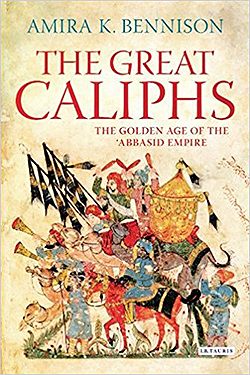| London: I. B. Tauris (2009) |
Runner-up in the Longman-History Today Book of the Year Award, 2009 and honourable mention in the BRISMES book prize 2010.
The flowering of the 'Abbasid caliphate between 750 and 1258 CE is often considered the classical age of Islamic civilization. In the preceding 120 years the Arabs had conquered much of the known world of antiquity and established a vast empire stretching from Spain to China. But was this empire really so very different, as has sometimes been claimed, from what it superseded? The Great Caliphs creatively explores the immense achievements of the 'Abbasid age through the lens of Mediterranean history. When the Umayyad caliphs were replaced by the 'Abbasids in 750, and the Arab capital moved to Baghdad, Iraq quickly became the centre not only of an imperium but also of a culture built on the foundations of the great civilizations of antiquity: Greece, Rome, Byzantium and Persia. Debunking popular misconceptions about the Arab conquests, Amira Bennison shows that, far from seeing themselves as purging the 'occidental' culture of the ancient world with a 'pure' and 'oriental' Islamic doctrine, the 'Abbasids perceived themselves to be as much within the tradition of Mediterranean and Near Eastern empire as any of their predecessors. Like other outsiders who inherited the Roman Empire, the Arabs had as much interest in preserving as in destroying, even while they were challenged by the paganism of the past. Indebted to that past while building creatively on its foundations, the 'Abbasids and their rulers inculcated and nurtured precisely the 'civilized' values which western civilization so often claims to represent.
Publication details for the US edition: New York, Yale University Press, 2009

